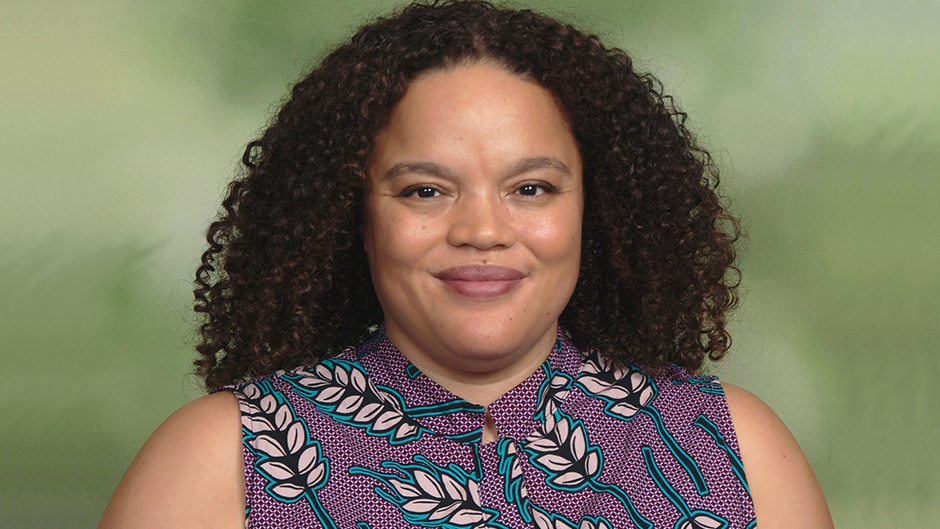Dr. Cae Joseph-Masséna, an assistant professor of French Language and Literatures in the Michele Bowman Underwood Department of Modern Languages and Literatures at the University of Miami College of Arts and Sciences, has won a Postdoctoral Research Leave Fellowship from the American Association of University Women (AAUW).
The award is designed to help early career women academics by giving them time to make significant progress on their book projects. Publishing an academic monograph is a key requirement for tenure track assistant professors to be considered for promotion to the level of associate professor.
The AAUW awarded the fellowship to 16 scholars this year, largely to researchers in the humanities.
During her one-year research leave, Joseph-Masséna will use the time away from her usual teaching responsibilities and faculty service to focus on her manuscript.
Joseph-Masséna is a jazz vocalist and cultural critic, who works in the areas of Francophone Studies, Haitian/Vodou Studies, Sound/Voice Studies, and Women’s Studies. She researches the entanglement of voice, music, and ritual in Black women’s texts.
Her book project investigates novels written in French by three contemporary Haitian women writers: Marie Vieux-Chauvet, Marie-Célie Agnant and Kettly Mars.
During her graduate training at University of Maryland, College Park, when she was choosing a dissertation subject, Joseph-Masséna’s background as a singer alerted her to novels by Haitian women that tell a puzzling story about voice. In these works, the protagonist, who always resembles the Vodou deity Ezili (goddess of love), is engaged in an intense vocal occupation that mysteriously propels her into an irrepressible and spectacular metamorphosis.
Inspired by this narrative approach that features vocally induced metamorphoses in texts saturated with the presence of Ezili, Joseph-Masséna conceptualizes these works as forming a literary genre she calls “Ezili-phonic fiction.”
“What I like about these novels is that they help us to understand our voices differently,” says Joseph-Masséna. She adds: “This genre is important to me because it is rooted in a Haitian feminist imagination that draws on Vodou spirituality, to place voice at the center of the human experience.”
Joseph-Masséna, the daughter of a Haitian philosopher, expressed joy and gratitude for the support that the grant has afforded her.
“I am very happy to have been chosen to represent underrepresented academic women with this grant, and to have this great opportunity to highlight Haitian women’s intellectual contributions as a UM faculty member and scholar, and as a Miami-based woman of Haitian descent,” said Joseph-Masséna. “It is especially meaningful to receive the grant this year, in light of recent state-sanctioned efforts to erase Black history from the Florida narrative.”
She also mentioned that she is glad for the community-based support that the grant provides.
“I am one of 285 fellows and grantees in the 2023-24 award year. We meet roughly once or twice a month for discussion,” Joseph-Masséna explained. “I am also part of a smaller community of other junior academic women working on their first book. Everyone can relate to how tricky the process is.”
The grant Joseph-Masséna received is the largest AAUW fellowship provides. This year, the foundation is awarding $6 million to women at all stages of their academic careers: from graduate students to professors, both in the U.S. and internationally, and for a variety of projects and amounts.
Notably, the MLL faculty member is the only literary scholar to secure the Postdoctoral American Fellowship grant this year. “A large proportion of AAUW grant recipients are STEM scholars,” Joseph-Masséna said. “Still, there are opportunities to meet with people in different fields, including social sciences and elsewhere in the humanities, who share overlapping interests.”
With mentorship and guidance from both within her academic department and the UM Center for Global Black Studiesas well as her global community of scholars through AAUW, Joseph-Masséna is now in a place to make significant progress on her book.
“I am excited at the opportunity to see this project through. I have been working on it since 2018. Having this time means that I can do it justice, in a way that feels personally satisfying,” Joseph-Masséna said.

